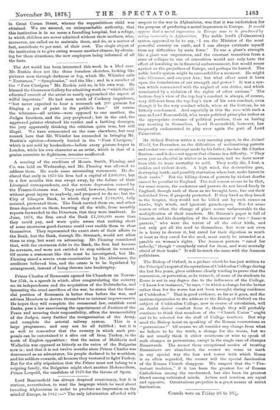The Bishop of Oxford, in a preface which he has
just written to the Principal's report of the operations of Cuddesdon College during the last five years, gives evidence clearly tending to prove that the conversion, or perversion, as he terms it, of some of its students to Rome is not in any degree due to the influences of the College. " I know few instances," he says, " in which a change for the better rather than for the worse has not been wrought during residence at Cuddesdon." That is good evidence, so far as it goes, and the anxious signatories to the address to the Bishop of Oxford on the subject of Cuddesdon College, now in course of circulation, will no doubt derive comfort from it, though they will probably continue to think that members of the "Church Union" ought not to be selected for the staff of College teachers. But why need the Bishop insist on speaking of the Roman conversions as " perversions ?" Of course we all consider any change from what we believe to be the truth, a change for the worse, but we do not usually think it either courteous or wise to speak of such changes as perversions, except in the single case of changes Romewards. The sooner these exceptional modes of treating Romanisers are abandoned, the sooner we cease to mark in any special way the fear and terror with which home is so often regarded, the sooner will the special fascination of the Roman Church disappear. We suspect that the " Pro- testant tradition," if it has been the greatest foe of Roman Catholicism among the uneducated, has also been its greatest friend among cultivated minds. Action and reaction are equal and opposite. Ostentatious prejudice is a great source of secret fascination.


































 Previous page
Previous page